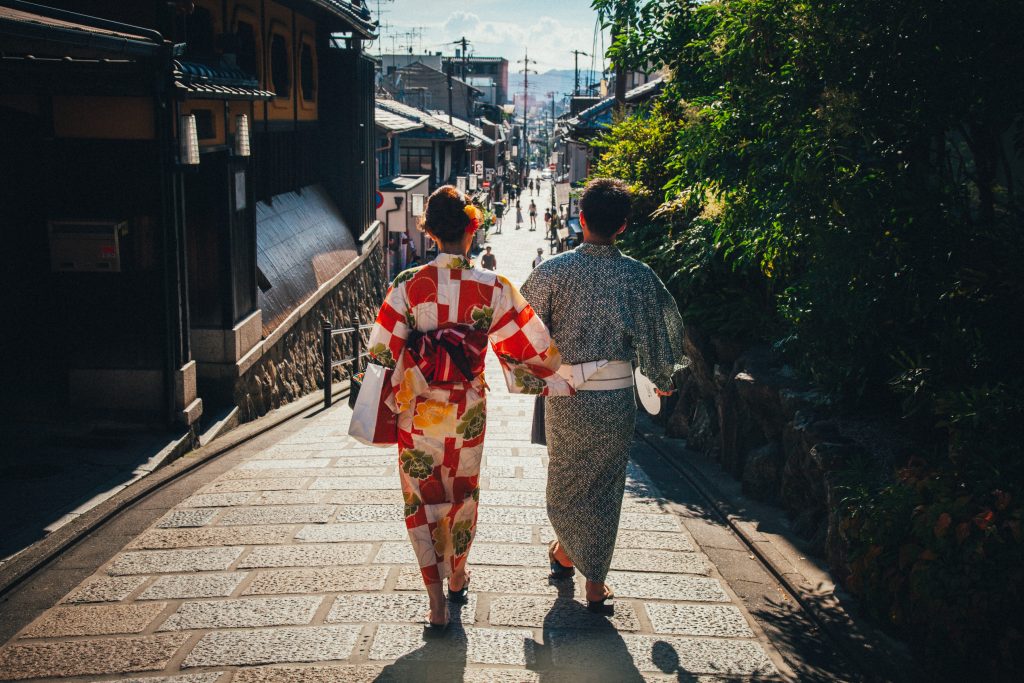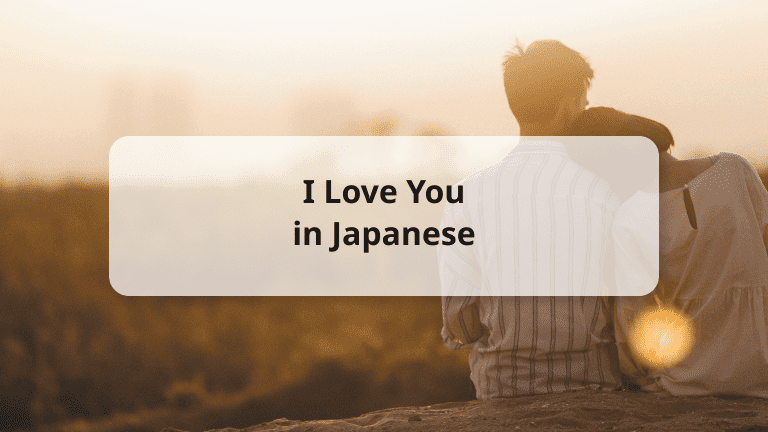How to say I love you in Japanese really? Since expressing your love to someone in Japan isn’t an easy task, knowing the right phrases to share your affection becomes very important. Apart from social class reasons, many different unspoken norms exist between the Japanese and westerners regarding displays of affection. It is more common for the Japanese to opt for more physical gestures whilst exercising moderation with the words “I love you.”
There are a lot of ways to say I love you in Japanese. Whats the difference between aishiteru vs daisuki? Is saying “I like you” in Japanese enough for your love? We will tell you the 5 most common ways to say I love you in Japanese. Before that, make sure you have mastered how to write all Japanese characters and got yourself a catchy Japanese name! Let’s learn how to say I love you in Japanese and share your love in the Japanese way together!

How to Say I Love You in Japanese: 5 Ways
| Japanese | Romaji | English Translation |
| 愛してる | Ai shiteru | I love you |
| あい しています | Ai shiteimasu | I love you (formal) |
| 好きだ | Suki da | I like you |
| 大好きだ | Daisuki da | I really like you |
| 好きやねん | Suki yanen | I like ya (slang) |
1. 愛してる Ai shiteru – I love you
Pronounced aye shi-te-roo, this is considered one of the most formal ways of verbally expressing love. This phrase is rarely used in conversation and it is commonly reserved for those in love, such as married couples, and even still used sparingly. In place of this phrase, the native Japanese person may incorporate a series of loving gestures instead. Gift giving, acts of service and other physical demonstrations of love are often a more popular option. Verbal expressions, especially that of this particular phrase, are treated as something intimate and sacred. As such, its usage is something not as cavalier.
Example: 君を愛してる (Kimi wo ai shiteru)
Translation: I love you.
2. あい しています Ai shiteimasu – I love you (formal)
The longer and more formal version of the aforementioned ai shiteru, this expression is the least casual verbal expression of love. Reserved for the most intimate of moments, this is not the kind of expression that a pair who have been on a few dates would use. It is regarded as unnatural and stiff and is for those who want to be unambiguous and plainly understood. Again, this expression would be more commonly used between a married couple, perhaps even on the wedding day during an exchanging of vows and it is not an expression to be taken lightly.
Example: たをとても愛しています (Anata o totemo ai shiteimasu)
Translation: I love you so much.

3. 好きだ Suki da – I like you
More commonly accepted for more frequent use, this phrase’s connotations are more informal but not necessarily lighter. There are also different conjugations depending on gender, suki da yo for male speakers and suki yo for female speakers. Westerners might regard this phrase as too casual of an expression of love but in Japan, where verbal expressions are considered quite heavy, this is the perfect phrase to express your affections without creating an atmosphere of suffocating embarrassment. Used between lovers, it is sufficient enough to express romantic love without the formal connotations reserved for deeper types of bonds, like with engaged couples.
Example: 彼は彼女が好きだ (Kare ha kanojo ga suki da)
Translation: He likes her.
4. 大好きだ Daisuki da – I (really) like you
Where suki da is a simple yet effective “I like you,” the addition of the kanji character for big (大 – dai) loosely translates the overall phrase “I really like you.” This term can be used to express love of all kinds, from romantic to simple enjoyment. Used in many situations, this term can be for couples, friends and even inanimate objects like one’s favourite food. It is the phrase most popularly used in Japanese media and probably the one international audiences are most familiar with, due to its inclusion in manga and anime.
Example: 私はその両方とも大好きだ (Watashi ha sono ryouhoutomo daisuki da)
Translation: I like both of them very much.
5. 好きやねん Suki yanen – I like ya (slang)
This phrase is both informal/slang as well as a regional conjugation. The region in question is Osaka, Japan and the dialect is called Kansai-ben. Informality is most recognised and more welcome than the other declarations of affections listed, especially if the declaration is meant to be something said and acknowledged more casually. Say you want to tell your friend you appreciate them or you’re budding a new relationship and you aren’t exactly ready to formalize your feelings. Perhaps you don’t want to make the other party uncomfortable or too embarrassed. If any of these resonate, then this phrase is ideal.
Example: いま わ すき やねん (Ima wa suki yanen)
Translation: I like ya now.

Cultural Tips When Expressing Your Love in Japanese
Do Japanese ever say I love you?
The chances are low to hear them say I love you. As stated earlier, it isn’t uncommon for Japanese people to show their affections rather than actually saying I love you out loud. This doesn’t make them uncaring or cold in any way. On the contrary, the Japanese have loving gestures like helping their lovers with domestic tasks like cooking and cleaning.
These more tangible ways of expressing one’s love are more culturally accepted due to their strengthening qualities towards a couple’s bond or to reinforce how one feels towards someone they may care about but not necessarily feel romantic love for such as family or close friends.
This concept can be better understood for Westerners through the idea of love languages, where in this case, the Japanese are quicker to perform acts of service or exchange gifts before rushing towards words of affirmation. It culturally makes more sense to depict something as abstract as love through actions.
In Japan, men hesitate to say I love you in Japanese
According to a survey conducted by a Japanese dating site, there are several reasons cited by Japanese men as to why they may not be as quick to verbally express their romantic affections as their female counterparts.
Some men have stated that they regard the term to be something that shouldn’t be used recklessly and they restrain themselves to maintain its formality. Others say they’re simply too shy or that they find suki da more natural and sufficient enough to express their feelings.

What is the difference between showing your love in Japanese and in English?
As a language, Japanese has a lot more social rules to adhere to. Rules differ depending on the speaker, whom they are speaking with, gender norms and many other elements. In general, it is assumed that something as intimate as love is reserved for more familiar bonds in Japanese culture. One would not express their love for someone they have just met or someone with whom they have a more formal relationship. Social standards differ from area to area, and take understanding and adaptation to immerse yourself into the culture without judgement.

Now you know how to say I love you in Japanese
Now you have the perfect idea of what to say next time you’d like to express your love in Japanese, but knowing that is never enough. Learn how to say Good morning and Good night to your partner in Japanese as well or learn how to describe their look to show your love since saying I love you seems too direct in a way. Like with any language, it takes practice and allowing yourself room to grow and improve. Remember to take into account any social conventions that better explain certain rules that may seem unclear at first. Learn to speak Japanese like a native speaker with AmazingTalker.
But don’t stop your language journey for spreading love here! If you want to learn how to express love in other languages, we have you covered, no matter is is the romantic I love you in French or the passionate I love you in Spanish or the cute ways to show your love in Korean! Check them out!
















